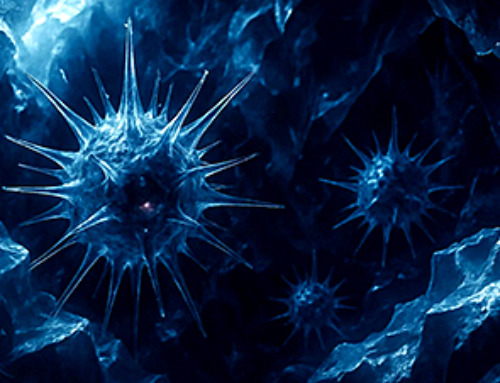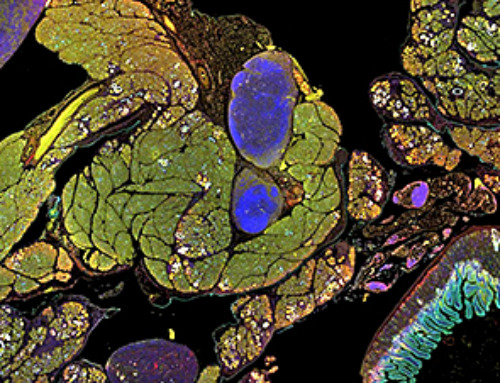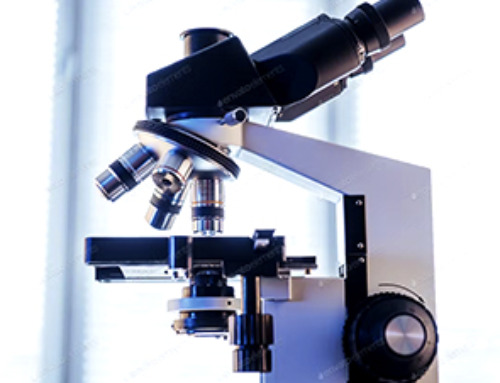Menadione, a vitamin K precursor, shows promise in slowing prostate cancer in mice by disrupting cancer cell survival processes, with potential applications for human treatment and myotubular myopathy therapy.
Prostate cancer is a quiet killer. In most men, it’s treatable. While it’s treatable in many men, some cases prove resistant to all current therapies and become highly aggressive. Researchers at Cold Spring Harbor Laboratory (CSHL) have made a new discovery that could lead to a game-changing solution.
CSHL Professor Lloyd Trotman’s lab has found that the pro-oxidant supplement menadione slows prostate cancer progression in mice. The supplement is a precursor to vitamin K, commonly found in leafy greens. The story begins more than two decades ago.
In 2001, the National Cancer Institute’s SELECT trial sought to determine if an antioxidant vitamin E supplement could successfully treat or prevent prostate cancer. The trial involving 35,000 men was planned to last up to 12 years.

However, after just three years, participants were told to stop taking their supplements. Not only had vitamin E failed to slow or prevent prostate cancer—more men taking the supplement started to get the disease. Seeing these results, Trotman thought, ‘If an antioxidant failed, maybe a pro-oxidant would work.’ His new findings in mice show just that.
How Menadione Targets Cancer Cells
When mice with prostate cancer are given menadione, it messes with the cancer’s survival processes. Trotman’s team has discovered that menadione kills prostate cancer cells by depleting a lipid called PI(3)P, which works like an ID tag. Without it, the cells stop recycling incoming materials and eventually explode.
“It’s like a transport hub, like JFK. If everything that goes in is immediately de-identified, nobody knows where the airplanes should go next. New stuff keeps coming in, and the hub starts to swell. This ultimately leads to the cell bursting,” explains Trotman.
This causes the cancer’s progression to slow significantly in mice. Trotman now hopes to see the experiment translated to pilot studies in human prostate cancer patients:
“Our target group would be men who get biopsies and have an early form of the disease diagnosed. We wonder if they start to take the supplement, whether we would be able to slow that disease down.”
Amazingly, Trotman’s research suggests menadione may also prove effective against myotubular myopathy, a rare condition that prevents muscle growth in infant boys. Those diagnosed rarely live beyond early childhood. Trotman’s lab has found that depleting PI(3)P with menadione can double the lifespan of mice with this condition.
If the results hold up in humans, it would mean that men with prostate cancer can enjoy a better quality of life and more time with their families. It could also mean more precious time for children born with an incurable disease.
Reference: “Dietary pro-oxidant therapy by a vitamin K precursor targets PI 3-kinase VPS34 function” by Manojit M. Swamynathan, Shan Kuang, Kaitlin E. Watrud, Mary R. Doherty, Charlotte Gineste, Grinu Mathew, Grace Q. Gong, Hilary Cox, Eileen Cheng, David Reiss, Jude Kendall, Diya Ghosh, Colleen R. Reczek, Xiang Zhao, Tali Herzka, Saulė Špokaitė, Antoine N. Dessus, Seung Tea Kim, Olaf Klingbeil, Juan Liu, Dawid G. Nowak, Habeeb Alsudani, Tse-Luen Wee, Youngkyu Park, Francesca Minicozzi, Keith Rivera, Ana S. Almeida, Kenneth Chang, Ram P. Chakrabarty, John E. Wilkinson, Phyllis A. Gimotty, Sarah D. Diermeier, Mikala Egeblad, Christopher R. Vakoc, Jason W. Locasale, Navdeep S. Chandel, Tobias Janowitz, James B. Hicks, Michael Wigler, Darryl J. Pappin, Roger L. Williams, Paolo Cifani, David A. Tuveson, Jocelyn Laporte and Lloyd C. Trotman, 25 October 2024, Science.
DOI: 10.1126/science.adk9167
Funding: National Cancer Institute, Pershing Square Sohn Cancer Research Alliance, IC-MedTech, U.S. Department of Defense, Simons Foundation, AstraZeneca UK, Medical Research Council, Robertson Research Fund
News
Studies detail high rates of long COVID among healthcare, dental workers
Researchers have estimated approximately 8% of Americas have ever experienced long COVID, or lasting symptoms, following an acute COVID-19 infection. Now two recent international studies suggest that the percentage is much higher among healthcare workers [...]
Melting Arctic Ice May Unleash Ancient Deadly Diseases, Scientists Warn
Melting Arctic ice increases human and animal interactions, raising the risk of infectious disease spread. Researchers urge early intervention and surveillance. Climate change is opening new pathways for the spread of infectious diseases such [...]
Scientists May Have Found a Secret Weapon To Stop Pancreatic Cancer Before It Starts
Researchers at Cold Spring Harbor Laboratory have found that blocking the FGFR2 and EGFR genes can stop early-stage pancreatic cancer from progressing, offering a promising path toward prevention. Pancreatic cancer is expected to become [...]
Breakthrough Drug Restores Vision: Researchers Successfully Reverse Retinal Damage
Blocking the PROX1 protein allowed KAIST researchers to regenerate damaged retinas and restore vision in mice. Vision is one of the most important human senses, yet more than 300 million people around the world are at [...]
Differentiating cancerous and healthy cells through motion analysis
Researchers from Tokyo Metropolitan University have found that the motion of unlabeled cells can be used to tell whether they are cancerous or healthy. They observed malignant fibrosarcoma cells and [...]
This Tiny Cellular Gate Could Be the Key to Curing Cancer – And Regrowing Hair
After more than five decades of mystery, scientists have finally unveiled the detailed structure and function of a long-theorized molecular machine in our mitochondria — the mitochondrial pyruvate carrier. This microscopic gatekeeper controls how [...]
Unlocking Vision’s Secrets: Researchers Reveal 3D Structure of Key Eye Protein
Researchers have uncovered the 3D structure of RBP3, a key protein in vision, revealing how it transports retinoids and fatty acids and how its dysfunction may lead to retinal diseases. Proteins play a critical [...]
5 Key Facts About Nanoplastics and How They Affect the Human Body
Nanoplastics are typically defined as plastic particles smaller than 1000 nanometers. These particles are increasingly being detected in human tissues: they can bypass biological barriers, accumulate in organs, and may influence health in ways [...]
Measles Is Back: Doctors Warn of Dangerous Surge Across the U.S.
Parents are encouraged to contact their pediatrician if their child has been exposed to measles or is showing symptoms. Pediatric infectious disease experts are emphasizing the critical importance of measles vaccination, as the highly [...]
AI at the Speed of Light: How Silicon Photonics Are Reinventing Hardware
A cutting-edge AI acceleration platform powered by light rather than electricity could revolutionize how AI is trained and deployed. Using photonic integrated circuits made from advanced III-V semiconductors, researchers have developed a system that vastly [...]
A Grain of Brain, 523 Million Synapses, Most Complicated Neuroscience Experiment Ever Attempted
A team of over 150 scientists has achieved what once seemed impossible: a complete wiring and activity map of a tiny section of a mammalian brain. This feat, part of the MICrONS Project, rivals [...]
The Secret “Radar” Bacteria Use To Outsmart Their Enemies
A chemical radar allows bacteria to sense and eliminate predators. Investigating how microorganisms communicate deepens our understanding of the complex ecological interactions that shape our environment is an area of key focus for the [...]
Psychologists explore ethical issues associated with human-AI relationships
It's becoming increasingly commonplace for people to develop intimate, long-term relationships with artificial intelligence (AI) technologies. At their extreme, people have "married" their AI companions in non-legally binding ceremonies, and at least two people [...]
When You Lose Weight, Where Does It Actually Go?
Most health professionals lack a clear understanding of how body fat is lost, often subscribing to misconceptions like fat converting to energy or muscle. The truth is, fat is actually broken down into carbon [...]
How Everyday Plastics Quietly Turn Into DNA-Damaging Nanoparticles
The same unique structure that makes plastic so versatile also makes it susceptible to breaking down into harmful micro- and nanoscale particles. The world is saturated with trillions of microscopic and nanoscopic plastic particles, some smaller [...]
AI Outperforms Physicians in Real-World Urgent Care Decisions, Study Finds
The study, conducted at the virtual urgent care clinic Cedars-Sinai Connect in LA, compared recommendations given in about 500 visits of adult patients with relatively common symptoms – respiratory, urinary, eye, vaginal and dental. [...]





















